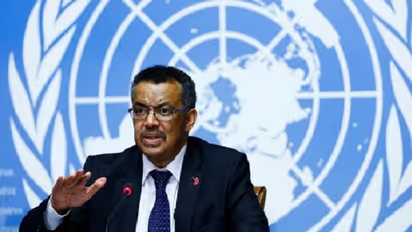Omicron is ‘dangerous’, especially for unvaccinated, says WHO chief Tedros Ghebreyesus

Synopsis
"While Omicron produces less severe illness than Delta, it remains a hazardous virus, particularly for people who have not been immunized," WHO Director-General Tedros Adhanom Ghebreyesus said during a news briefing.
The Omicron type of Covid-19 is harmful, particularly for people who have not been immunized against the illness, according to the World Health Organization on Wednesday. The WHO stated that Omicron was to blame for the massive worldwide increase in cases, but that there should be no surrender to the variant of concern. "While Omicron produces less severe illness than Delta, it remains a hazardous virus, particularly for people who have not been immunized," WHO Director-General Tedros Adhanom Ghebreyesus said during a news briefing.
He stated that we must not give this virus a free ride or wave the white flag, especially because many people remain unprotected. Tedros went on to say that in Africa, more than 85 per cent of individuals had yet to receive a single dosage of vaccination. We won't halt the pandemic's acute phase until we close this gap. Tedros aimed for every country to have 10% of their people vaccinated by the end of September 2021, 40% by the end of December, and 70% by the middle of 2022. However, he added that 90 nations have not yet hit 40 per cent, with 36 still falling short of the 10-percentage-point goal.
Also Read | Omicron variant spread pushing COVID towards being an endemic, says EU's drug watchdog
He went on to say that the "vast majority" of persons hospitalized in hospitals throughout the world were unvaccinated. While vaccinations continue to be quite successful in reducing mortality and severe Covid-19 illness, they do not completely prevent transmission, according to Tedros. "More transmission implies more hospitalizations, more fatalities, more people out of work – including teachers and health professionals – and an increased danger of another variation arising that is even more transmissible and lethal than Omicron." Tedros stated that the global death toll has stabilized at roughly 50,000 per week.
Check the Breaking News Today and Latest News from across India and around the world. Stay updated with the latest World News and global developments from politics to economy and current affairs. Get in-depth coverage of China News, Europe News, Pakistan News, and South Asia News, along with top headlines from the UK and US. Follow expert analysis, international trends, and breaking updates from around the globe. Download the Asianet News Official App from the Android Play Store and iPhone App Store for accurate and timely news updates anytime, anywhere.